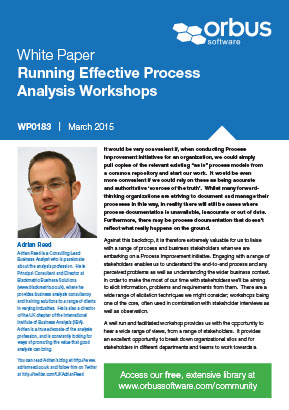Adrian Reed discusses the importance of effective workshops in Process Improvement initiatives and how best to run them.
It would be very convenient if, when conducting Process Improvement initiatives for an organization, we could simply pull copies of the relevant existing “as is” process models from a common repository and start our work. It would be even more convenient if we could rely on these as being accurate and authoritative ‘sources of the truth’. Whilst many forward-thinking organizations are striving to document and manage their processes in this way, in reality there will still be cases where process documentation is unavailable, inaccurate or out of date. Furthermore, there may be process documentation that doesn’t reflect what really happens on the ground.
Against this backdrop, it is therefore extremely valuable for us to liaise with a range of process and business stakeholders when we are embarking on a Process Improvement initiative. Engaging with a range of stakeholders enables us to understand the end-to-end process and any perceived problems as well as understanding the wider business context. In order to make the most of our time with stakeholders we’ll be aiming to elicit information, problems and requirements from them. There are a wide range of elicitation techniques we might consider; workshops being one of the core, often used in combination with stakeholder interviews as well as observation.
Sign in to continue reading this ebook guide from Adrian Reed.
